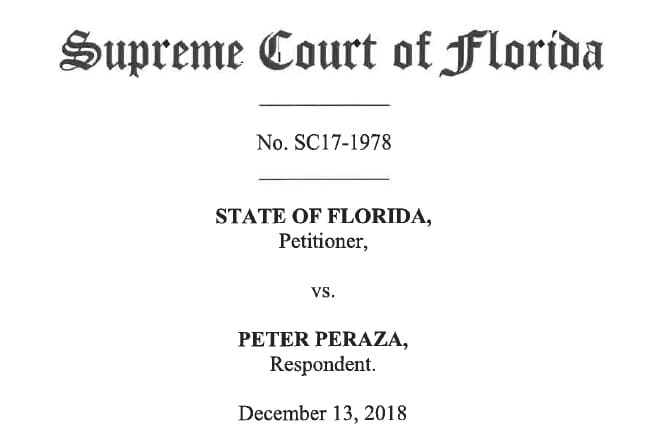Florida Supreme Court rules 7-0 that Cops are covered under Stand Your Ground
Posted: Fri Dec 14, 2018 8:41 am

The Supreme Court of Florida has ruled 7-0 that law enforcement officers who uses deadly force during a lawful arrest which he/she believes is reasonably necessary to prevent imminent death or great bodily harm to himself/herself or others, may invoke immunity from criminal prosecution under the Stand Your Ground law.
This stems from an incident on July 31, 2013; when Broward County Sheriff Deputy Peter Peraza shot and killed Jermaine McBean at an apartment pool complex. McBean appearing to be mentally distraught purchased an air rifle that day and was walking around the complex. Deputy Peraza responded to the scene and issued commands to McBean to put the weapon down. McBean didn't listen, pointed the air rifle at Deputy Peraza, and the rest is what you'd expect. The deputy was in fear for his life and fired, not knowing that it was simply an air rifle being pointed at him.
Deputy Peraza was charged with manslaughter and his defense attorney cited both criminal and civil immunity under Florida Statute 776.012(1), 776.032(1). The collection of laws that is commonly refereed to as "Stand Your Ground".
The State Attorney's Office appealed that Deputy Peraza was not eligible for SYG due to being covered by 776.05. The statute that gives law enforcement officers coverage when they use of force in making an arrest, but not immunity from prosecution. The State's appeal was rejected by the Supreme Court and stated;
Because these statutes plainly and unambiguously afford Stand Your Ground immunity to any “person†who acts in self-defense, there should be no reason for further analysis. See Holly, 450 So. 2d at 219. Put simply, a law enforcement officer is a “person†whether on duty or off, and irrespective of whether the officer is making an arrest. Although neither of the two statutes defines the word “person,†it must be given its “plain and ordinary meaning.†Green v. State, 604 So. 2d 471, 473 (Fla. 1992). In common understanding, “person†refers to a “human being,†Webster’s Third New International Dictionary 1686 (1993 ed.), which is not occupation-specific and plainly includes human beings serving as law enforcement officers.
For the foregoing reasons, we resolve the certified conflict and answer the certified question by holding that law enforcement officers are eligible to assert Stand Your Ground immunity, even when the use of force occurred in the course of making a lawful arrest. Based upon the trial court’s findings of fact, Deputy Peraza is entitled to that immunity and is therefore immune from criminal prosecution.
What does this mean in the future for Florida Law Enforcement and the Law Abiding Public? My personal opinion is now that the courts have ruled that SYG applies to law enforcement. I see the Industrial Civilian Disarmament Complex dropped down a notch or two from getting general police support to repeal or the laws that make up SYG by declaring them unconstitutional.